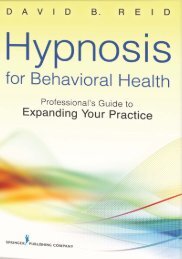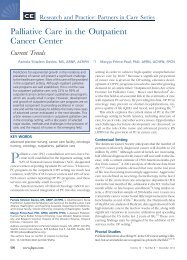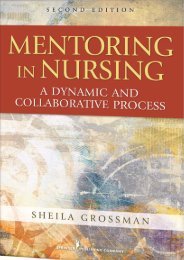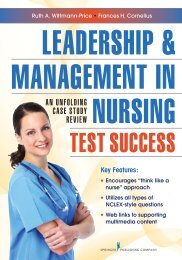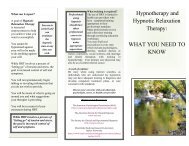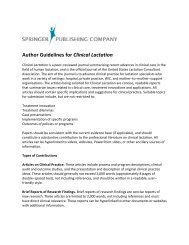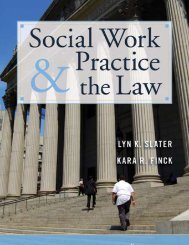Expertise in nursing practice : caring, clinical judgment - Springer ...
Expertise in nursing practice : caring, clinical judgment - Springer ...
Expertise in nursing practice : caring, clinical judgment - Springer ...
You also want an ePaper? Increase the reach of your titles
YUMPU automatically turns print PDFs into web optimized ePapers that Google loves.
Chapter 1 The Relationship of Theory and Practice <strong>in</strong> the Acquisition of Skill 15<br />
of a complex competition. In fact, at the moment of <strong>in</strong>volved <strong>in</strong>tuitive<br />
response, there can be no doubt, s<strong>in</strong>ce doubt comes only with detached<br />
evaluation of performance.<br />
Notice that we have stressed how the <strong>in</strong>volved, experienced performerseesgoals<br />
and salient facts but nothowhe sees immediately what<br />
to do to achieve these goals. This is because there are far fewer ways of<br />
see<strong>in</strong>g what is go<strong>in</strong>g on than ways of <strong>in</strong>terven<strong>in</strong>g through actions. The<br />
proficient performer simply has notyet had enough experience with the<br />
wide variety of possible actions <strong>in</strong> each of the situations that hecan now<br />
discrim<strong>in</strong>ate to have renderedthe best response automatic.For this reason,<br />
the proficient performer, see<strong>in</strong>g the goal and the important features<br />
of the situation, still must decide what to do. To do this, he falls back on<br />
detached, rule-based determ<strong>in</strong>ation of actions.<br />
The proficient driver, approach<strong>in</strong>g a curve on a ra<strong>in</strong>y day, may <strong>in</strong>tuitively<br />
realize, due to bra<strong>in</strong> activity <strong>in</strong>duced by synaptic modifications<br />
produced dur<strong>in</strong>g prior experiences, that she is go<strong>in</strong>g dangerously fast.<br />
She then consciously decides whether to apply the brakes or merely reduce<br />
pressure by some selected amount on the accelerator. Wecall this<br />
driver proficient rather than expert because valuable moments may be<br />
lost while an actionisconsciously chosen,or time pressure may lead to a<br />
less than optimal choice.Yet, this driveriscerta<strong>in</strong>ly more likely to safely<br />
negotiate the curve than is the competent driver, who spends additional<br />
time decid<strong>in</strong>g, based onspeed, angleofbank, and felt gravitational forces,<br />
that the car’s speed isexcessive.<br />
STAGE 5: EXPERT<br />
The expert not only knows what needs to be achieved, based on mature<br />
and <strong>practice</strong>d situational discrim<strong>in</strong>ation, but also knows how to achieve<br />
the goal. A more subtle and ref<strong>in</strong>ed discrim<strong>in</strong>ation ability is what dist<strong>in</strong>guishes<br />
theexpert from the proficient performer. This ability allows the<br />
expert to discrim<strong>in</strong>ate among situations all seen as similar with respect<br />
to the plan or perspective, dist<strong>in</strong>guish<strong>in</strong>g those situations requir<strong>in</strong>g one<br />
action fromthose demand<strong>in</strong>g another. As with the proficient performer,<br />
synaptic modifications caused byactions, experienced with <strong>in</strong>volvement<br />
account for responses that turn out to be appropriate be<strong>in</strong>g re<strong>in</strong>forced,<br />
while those that do not work out well are <strong>in</strong>hibited. In short, the expert<br />
not only sees what needs to be achieved but also howto achieve it. When<br />
th<strong>in</strong>gs are proceed<strong>in</strong>g normally, experts do not solve problems and do



